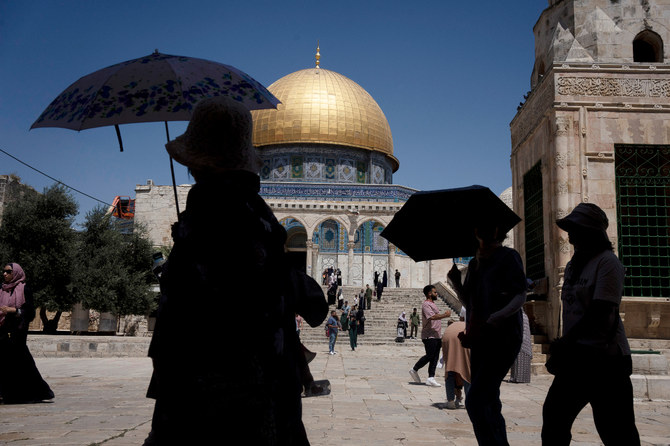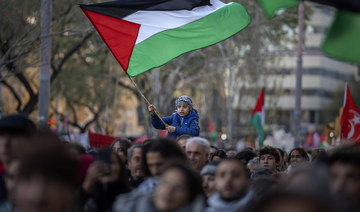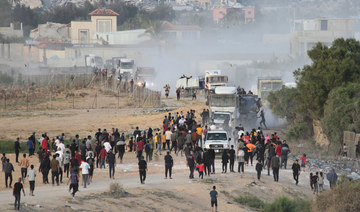TEL AVIV, Israel: Israel’s far right national security minister, Itamar Ben Gvir, visited Jerusalem’s Al Aqsa Mosque compound on Wednesday, declaring the contested holy site belongs “only to the state of Israel.”
Ben-Gvir said Wednesday’s visit was a response to a move by three European countries to unilaterally recognize an independent Palestinian state.
“We will not even allow a statement about a Palestinian state,” he said.
The hilltop compound is revered by Jews and Muslims, and the conflicting claims have led to numerous rounds of violence in the past.
Israel allows Jews to visit the compound, but not to pray there. But the visit is likely to be seen around the world as a provocation.
Norway, Ireland and Spain said Wednesday they are recognizing a Palestinian state in a historic move that drew condemnation from Israel and jubilation from the Palestinians. Israel immediately ordered back its ambassadors from Norway and Ireland.
The formal recognition will be made on May 28. The development is a step toward a long-held Palestinian aspiration that came against the backdrop of international outrage over the civilian death toll and humanitarian crisis in the Gaza Strip following Israel’s offensive there.
It was a lightning cascade of announcements. First was Norway, whose Prime Minister Jonas Gahr Støre said “there cannot be peace in the Middle East if there is no recognition.”
“By recognizing a Palestinian state, Norway supports the Arab peace plan,” he said and added that the Scandinavian country will “regard Palestine as an independent state with all the rights and obligations that entails.”
Several European Union countries have in the past weeks indicated that they plan to make the recognition, arguing a two-state solution is essential for lasting peace in the region. The decision may generate momentum for the recognition of a Palestinian state by other EU countries and could spur further steps at the United Nations, deepening Israel’s isolation.
Norway, which is not a member of the EU but mirror its moves, has been an ardent supporter of a two-state solution between Israel and the Palestinians.
“The terror has been committed by Hamas and militant groups who are not supporters of a two-state solution and the state of Israel,” the Norwegian government leader said. “Palestine has a fundamental right to an independent state.”
Since the unprecedented attack by Hamas-led militants on Israel on Oct. 7, Israeli forces have led assaults on the northern and southern edges of the Gaza Strip in May, causing a new exodus of hundreds of thousands of people, and sharply restricted the flow of aid, raising the risk of famine.
Wednesday’s announcements come more than 30 years after the first Oslo agreement was signed in 1993. Since then, “the Palestinians have taken important steps toward a two-state solution,” the Norwegian government said.
It added that the World Bank determined that a Palestinian state had met key criteria to function as a state in 2011, that national institutions have been built up to provide the population with important services.
“The war in Gaza and the constant expansion of illegal settlements in the West Bank still mean that the situation in Palestine is more difficult than it has been in decades,” it said.
In making his announcement, Irish Prime Minister Simon Harris said the move was coordinated with Spain and Norway — and that it was a “historic and important day for Ireland and for Palestine.” He said it was intended to help move the Israeli-Palestinian conflict to resolution through a two-state solution.
Harris said he thinks other countries will join Norway, Spain and Ireland in recognizing a Palestinian state “in the weeks ahead.”
Spanish Prime Minister Pedro Sánchez, Spain’s Socialist leader since 2018, made the expected announcement to the nation’s Parliament on Wednesday. He had spent months touring European and Middle Eastern countries to garner support for the recognition, as well as for a possible ceasefire in Gaza. He has said several times that he was committed to the move.
“We know that this initiative won’t bring back the past and the lives lost in Palestine, but we believe that it will give the Palestinians two things that are very important for their present and their future: dignity and hope,” Sánchez said.
“This recognition is not against anyone, it is not against the Israeli people,” Sánchez added, while acknowledging that it will most likely cause diplomatic tensions with Israel. “It is an act in favor of peace, justice and moral consistency.”
Sánchez argued that the move is needed to support the viability of a two-state solution that he said “is in serious danger” with the war in Gaza.
“I have spent weeks and months speaking with leaders inside and outside of the region and if one thing is clear is that Prime Minister (Benjamin) Netanyahu does not have a project of peace for Palestine, even if the fight against the terrorist group Hamas is legitimate,” the Spanish leader said.
Earlier this month, Spain’s Foreign Minister José Albares said he had informed US Secretary of State Antony Blinken of his government’s intention to recognize a Palestinian state.
Hugh Lovatt, a senior policy fellow at the European Council on Foreign Relations, said “recognition is a tangible step toward a viable political track leading to Palestinian self-determination.”
But in order for it to have an impact, he said, it must come with “tangible steps to counter Israel’s annexation and settlement of Palestinian territory – such as banning settlement products and financial services.”
Israel’s Foreign Minister Israel Katz ordered Israel’s ambassadors from Ireland and Norway to immediately return to Israel. He spoke before Spain’s announcement.
“Ireland and Norway intend to send a message today to the Palestinians and the whole world: terrorism pays,” Katz said.
He said that the recognition could impede efforts to return Israel’s hostages being held in Gaza and makes a ceasefire less likely by “rewarding the jihadists of Hamas and Iran.” He also threatened to recall Israel’s ambassador to Spain if the country takes a similar position.
Regarding the Israeli decision to recall its ambassador in Oslo, Gahr Støre said “we will take note of that. This is a government with which we have many disagreements. What we agree on is to condemn Hamas’s cruel attack on Oct. 7.”
Palestinian President Mahmoud Abbas, speaking after Norway’s announcement, welcomed the move and called on other countries to follow.
In a statement carried by the official Wafa news agency, Abbas said Norway’s decision will enshrine “the Palestinian people’s right to self-determination” and support efforts to bring about a two-state solution with Israel.
Some 140 countries have already recognized a Palestinian state — more than two-thirds of United Nations members — but none of the major Western powers has done so. This move could put more pressure continental heavyweights France and Germany to reconsider their position.
The United States and Britain, among others, have backed the idea of an independent Palestinian state existing alongside Israel as a solution to the Middle East’s most intractable conflict. They insist, however, that Palestinian independence should come as part of a negotiated settlement.
The head of the Arab League called the step taken by the trio of European nations as “a courageous step.”
“I salute and thank the three countries for this step that puts them on the right side of history in this conflict,” Arab League Secretary-General Ahmed Aboul-Gheit wrote on the social media platform X.
Turkiye also applauded the decision, calling it an important step toward the restoration of the “usurped rights of the Palestinians.”
The Turkish Foreign Ministry also said the move would help “Palestine gain the status it deserves in the international community.”
Far-right Israeli Cabinet minister visits contested Jerusalem holy site, raising tensions
https://arab.news/z5w5z
Far-right Israeli Cabinet minister visits contested Jerusalem holy site, raising tensions

- The visit was a response to a move by three European countries to unilaterally recognize an independent Palestinian state
22 dead in shelling of Sudan’s besieged El-Fasher: medic
A doctor at the city’s Saudi Hospital said “bombardment of the livestock market and the Redayef neighborhood killed 22 people and wounded 17“
PORT SUDAN: Besieging Sudanese paramilitary forces pounded El-Fasher on Saturday, witnesses said, killing 22 people in Darfur’s last city outside their control, according to a hospital source.
El-Fasher has become a key battleground in the 15-month-long war pitting the paramilitary Rapid Support Forces (RSF) against the regular army.
The battle for the North Darfur state capital, seen as crucial for humanitarian aid in a region on the brink of famine, has raged for more than two months.
Witnesses said El-Fasher had come under heavy artillery bombardment by the RSF on Saturday.
“Some houses were destroyed by the shelling,” one witness said.
A doctor at the city’s Saudi Hospital told AFP on condition of anonymity that “bombardment of the livestock market and the Redayef neighborhood killed 22 people and wounded 17.”
It was the deadliest reported bombardment since the start of the month, when 15 civilians were killed in the shelling of another city market.
Intense fighting for El-Fasher erupted on May 10, prompting a siege by the RSF that has trapped hundreds of thousands of civilians.
Last month, the UN Security Council passed a resolution demanding an end to the siege.
US mediators are to make a new attempt in Switzerland next month to broker an end to the fighting. The talks are due to open on August 14.
Previous negotiations in Jeddah, Saudi Arabia, have failed to put an end to the fighting which has displaced millions, sparked warnings of famine and left swathes of the capital Khartoum in ruins.
Egypt’s presence at Gaza talks highlights its ‘pivotal role’ in region, says analyst

- Meeting in Rome fuels hope amid concerns that Israel is sabotaging peace negotiations
CAIRO: The presence of Egyptian delegates at a scheduled meeting in Rome to discuss a ceasefire in Gaza underscores Cairo’s “pivotal role” in the region, political analyst and MP Osama Al-Ashmouni told Arab News on Saturday, adding that it also shows Egypt’s unquestionable commitment to the Palestinian cause.
Egypt — along with Qatar and the US — has been involved in months of mediation efforts aimed at ending the war that has raged in the Gaza Strip for more than nine months.
A senior source told the Cairo News Channel that a meeting involving Egyptian, US, and Qatari officials and the head of Israeli Intelligence will take place in Rome on Sunday, in the hopes of developing an agreement that would immediately halt military engagements and guarantee the entry of humanitarian aid into Gaza.
The source said Egyptian authorities have stressed the importance of reaching an agreement that ensures the free movement of Gaza’s citizens and a complete withdrawal from the Rafah crossing.
Al-Ashmouni told Arab News that Egypt “has been a stalwart supporter of the Palestinian cause throughout its history, offering tremendous support to defend the rights of the Palestinian people and their quest to reclaim their occupied land and establish a Palestinian state.”
Al-Ashmouni added that Israel “consistently disseminates falsehoods and continues its deceptive practices and lies, whether in distorting Egypt’s role in supporting the Palestinian cause or by trying to portray itself as the victim, thereby reversing the roles of victim and perpetrator.
“It is crucial for attendees at the Rome meeting to recognize this, as the conscience of the free world should not heed the fabrications spread by the Israeli propaganda machine, despite the international community’s passive stance on Israel’s actions, which include crimes against humanity and war crimes against the unarmed Palestinian people in Gaza.”
Al-Ashmouni expressed his hope that the negotiations in Rome would prove effective, although he anticipates that Israel will continue what he called its policy of sabotaging peace negotiations.
Journalist Mahmoud Mosalam, a member of the Egyptian Senate, told Arab News that Egypt plays a crucial role in mediation talks amid “intense accusations by Israel and other parties who would prefer Egypt to withdraw from the role.”
Mosalam added: “They allege that Egypt is facilitating arms smuggling to the resistance, and some American media outlets falsely claim that Egypt has altered texts from previous negotiations.”
He hopes the negotiations in Rome, which will also include Palestinian and Italian officials, “will be fruitful and help Gaza emerge from its severe crisis, a situation akin to actual genocide.”
He added that the recent outpouring of global support for the Palestinian people gives them an opportunity that they must seize and said it is inevitable the war will end, which would present the Palestinian leaders with “significant responsibilities,” including the reconstruction of Gaza and the reorganization of the Palestinian administration in preparation for a “comprehensive resolution” of the Palestinian issue.
Heat wave forces Iran to shutter government offices and banks. Electricity consumption soars

- Banks, offices, and public institutions across the country close to protect people’s health and conserve energy, due to extreme temperatures
TEHRAN: A heat wave blanketing Iran has forced authorities to cut operating hours at various facilities Saturday and order all government and commercial institutions to shutter on Sunday.
The temperature ranged from 37 degrees Celsius (98.6 degrees Fahrenheit) to 42 C (about 107 F) in the capital, Tehran on Saturday, according to weather reports.
State-run IRNA news agency said banks, offices, and public institutions across the country would close on Sunday to protect people’s health and conserve energy, due to extreme temperatures and that only emergency services and medical agencies would be excluded.
Authorities also cut working hours on Saturday in many provinces due to the sweltering heat, IRNA reported, adding that high temperatures, over 40 C (104 F), have been registered in Tehran since Friday.
Iranian media warned people to stay indoors until 5 p.m. local time.
Authorities also said electricity consumption reached record levels of 78,106 megawatts on Tuesday.
Nournews, close to Iran’s Supreme National Security Council, reported Wednesday that Iran’s temperature is rising at twice the pace of the global temperature which has increased by more than one degree compared to the long-term average. Meanwhile, Iran has become warmer by 2 degrees over the past 50 years, the agency said.
Last year, Iran ordered a two-day nationwide holiday due to increasing temperatures.
170 killed in days-long Israeli operation, says Gaza civil defense

- Deir Al-Balah is one of the areas most populated with displaced families, and said over 100 others were wounded
GAZA: Gaza’s civil defense agency said Saturday that Israel’s military operation around Khan Yunis has killed about 170 people and wounded hundreds since it started on Monday.
“Since the beginning of the Israeli military operation in the Khan Yunis area, we are talking of approximately 170 martyrs and hundreds of wounded,” agency spokesman Mahmud Bassal told AFP.
He said many people had been displaced again on Saturday as the Israeli operation continued.
“The questions is where will these residents go?” Basal said.
“Anyone who sees the situation in Khan Yunis will witness thousands of people spread out on the ground, on the roads, in areas that unfortunately are not suitable for living.
“With no other options available, they are exposing themselves to death.”
Earlier on Saturday the military issued new evacuation orders for residents of the southern city, after retrieving the bodies of five Israelis and warning of new operations.
The United Nations said more than 180,000 Palestinians have fled Khan Yunis since the Israeli operation began on Monday.
The evacuation orders and “intensified hostilities” have “significantly destabilized aid operations,” it added, reporting “dire water, hygiene and sanitation conditions” across the Palestinian territory.
The Israeli military said it launched the operation to halt rocket fire from the area, which already saw heavy fighting earlier this year.
On Wednesday, it said troops had retrieved the bodies of five Israelis from the area.
They had been killed during the Hamas attacks of October 7 and their bodies taken back to Gaza, the military said.
On Saturday, it ordered residents from more parts of Khan Yunis “to temporarily evacuate to the adjusted humanitarian area in Al-Mawasi” — the second such adjustment made to the safe zone within a week.
Israel orders the evacuation of an area designated as a humanitarian zone in Gaza

- The war in Gaza has killed more than 39,100 Palestinians, according to the territory’s Health Ministry
KHAN YOUNIS: Israel’s military ordered the evacuation Saturday of a crowded part of Gaza designated as a humanitarian zone, saying it is planning an operation against Hamas militants in Khan Younis, including parts of Muwasi, a makeshift tent camp where thousands are seeking refuge.
The order comes in response to rocket fire that Israel says originates from the area. It’s the second evacuation issued in a week in an area designated for Palestinians fleeing other parts of Gaza. Many Palestinians have been uprooted multiple times in search of safety during Israel’s punishing air and ground campaign.
On Monday, after the evacuation order, multiple Israeli airstrikes hit around Khan Younis, killing at least 70 people, according to Gaza’s Health Ministry, citing figures from Nasser Hospital.
The area is part of a 60-square-kilometer (roughly 20-square-mile) “humanitarian zone” to which Israel has been telling Palestinians to flee to throughout the war. Much of the area is blanketed with tent camps that lack sanitation and medical facilities and have limited access to aid, United Nations and humanitarian groups say. About 1.8 million Palestinians are sheltering there, according to Israel’s estimates. That’s more than half Gaza’s pre-war population of 2.3 million.
The war in Gaza has killed more than 39,100 Palestinians, according to the territory’s Health Ministry, which doesn’t distinguish between combatants and civilians in its count. The UN estimated in February that some 17,000 children in the territory are now unaccompanied, and the number is likely to have grown since.
The war began with an assault by Hamas militants on southern Israel on Oct. 7 that killed 1,200 people, most of them civilians, and took about 250 hostages. About 115 are still in Gaza, about a third of them believed to be dead, according to Israeli authorities.
















